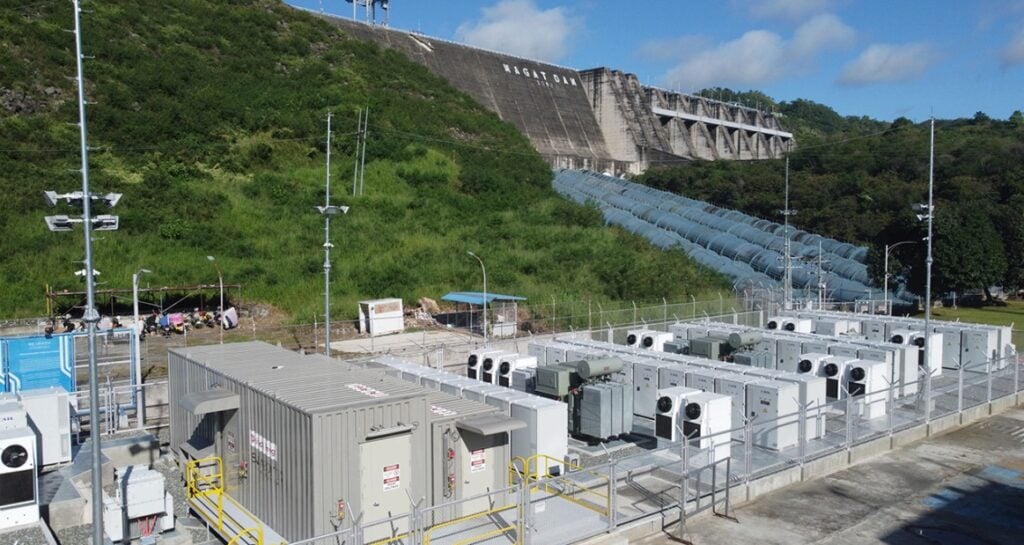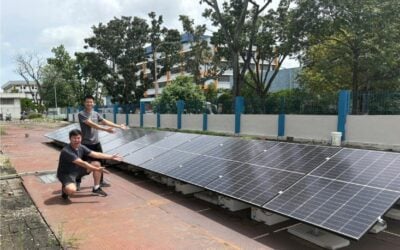
A large-scale battery storage facility providing ancillary services to the grid has gone into commercial operation at the site of a hydroelectric power plant in the Philippines.
Energy company Aboitiz Power disclosed to the Philippine Stock Exchange on 2 February that the 24MW Magat battery energy storage system (BESS) project in Ramon, a municipality in the district of Isabela, began participating in the reserve market a week earlier on 26 January.
Enjoy 12 months of exclusive analysis
- Regular insight and analysis of the industry’s biggest developments
- In-depth interviews with the industry’s leading figures
- Annual digital subscription to the PV Tech Power journal
- Discounts on Solar Media’s portfolio of events, in-person and virtual
It is co-located with the 388MW Magat Hydroelectric Power Plant, in the north of the Philippines’ largest island, Luzon. Provisional Authority to Operate, the necessary certification from the national Energy Regulatory Commission required for generation facilities connecting to the grid, was issued 17 January after testing and commissioning finished in December 2023.
The hydroelectric plant belongs to SN Aboitiz Power (SNAP), a clean energy joint venture (JV) between power generation, retail and distribution holding company Aboitiz Power and Norwegian renewable energy systems developer Scatec.
SNAP is also behind the new BESS asset. Construction began in Q3 2022, following a Final Investment Decision (FID) being taken that April, at which time an engineering, procurement and construction (EPC) contract was signed with Hitachi Energy.
Debt financing was provided by the Bank of the Philippine Islands and China Banking Corporation. The Magat BESS came online on schedule as previously announced by the Scatec-Aboitiz Power JV.
It is the JV’s second of 12 planned BESS projects to be completed from a pipeline of 248MW in the country announced so far, set to provide frequency regulation and contingency reserves. SNAP currently has four hydroelectric plants in operation too and is currently exploring the feasibility of a floating solar PV project as well as new hydroelectric capacity.
Economics driving case for short-duration storage in Philippines energy sector
As regular readers of Energy-Storage.news will likely be aware, major power companies in the Philippines have been deploying BESS at scale over the past couple of years.
In the Southeast Asian country’s top-down regulated energy market, power generators are tasked with providing frequency regulation and other ancillary services to maintain stability of the grid. Companies like Aboitiz Power and SMC have done this from their fleets of thermal power plants – and hydroelectric.
However, batteries can provide those ancillary services effectively and more efficiently than other resources which don’t have the split-second response times of lithium-ion (Li-ion) BESS technology and as noted in this Q4 2022 article from our quarterly technical journal PV Tech Power (Vol. 33), it has resulted in Philippine power producers becoming locked in something of a race to equip their portfolios with battery storage.
Assets colocated or hybridised with non-thermal resources are a little more rare, however. The Philippines’ first utility-scale solar-plus-storage pilot project only went into operation in early 2022 and various media reports claimed SNAP’s Magat BESS to be the country’s first to be paired with hydroelectric – a technology colocation for which a small handful of examples have been announced so far worldwide.
While in the shorter term, it’s the economics of frequency regulation that is driving the Philippines’ BESS market forwards, longer term the government’s intent to get to 50% renewable energy by 2040 will provide a driver. The president, Ferdinand Marcos Jr, attended the April 2023 inauguration of a large-scale BESS facility and spoke of the vital role the technology will play in the Philippine power sector. Meanwhile, market regulations are being adapted to better accomodate energy storage.
Aboitiz Power, roughly neck-and-neck with SMC as the country’s biggest power company by market share (both have around 21% each), has committed to exiting coal and also entered a collaboration with the World Bank’s International Finance Corporation (IFC) to study how cleaner resources like solar-plus-storage can provide ‘baseload’ power for the country.
Read more of Enegy-Storage.news’ coverage of the Philippines BESS market here.
Energy-Storage.news’ publisher Solar Media will host the 2nd Energy Storage Summit Asia, 9-10 July 2024 in Singapore. The event will help give clarity on this nascent, yet quickly growing market, bringing together a community of credible independent generators, policymakers, banks, funds, off-takers and technology providers. For more information, go to the website.






